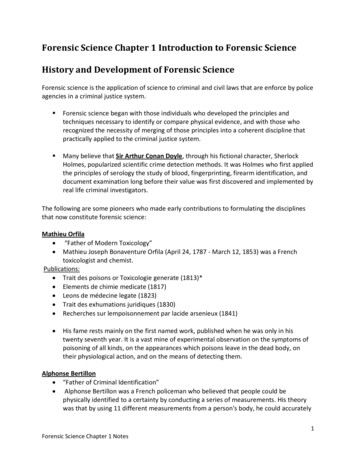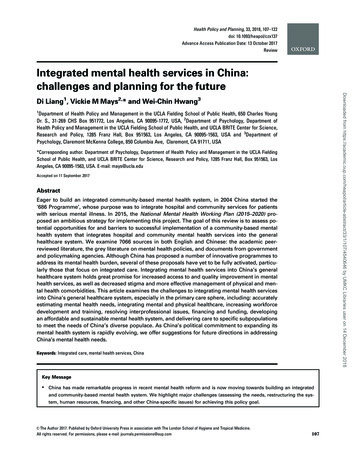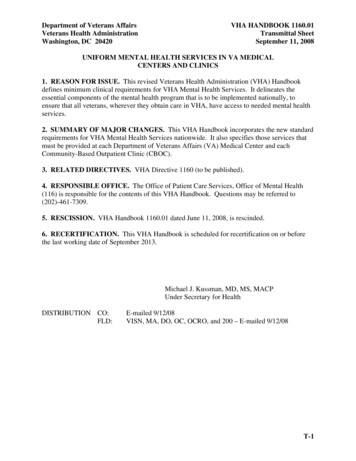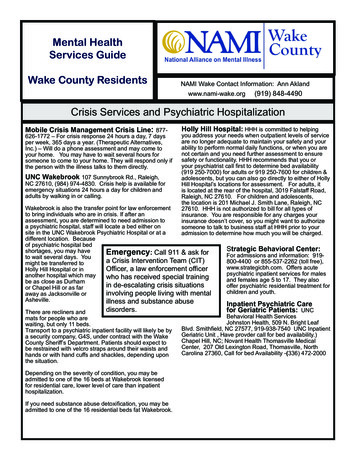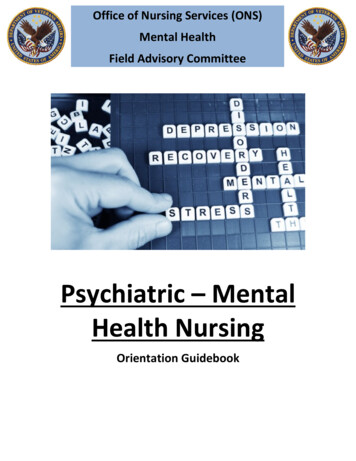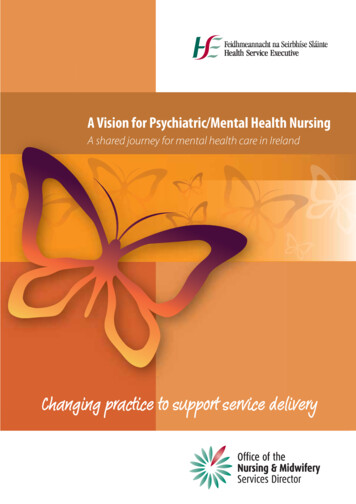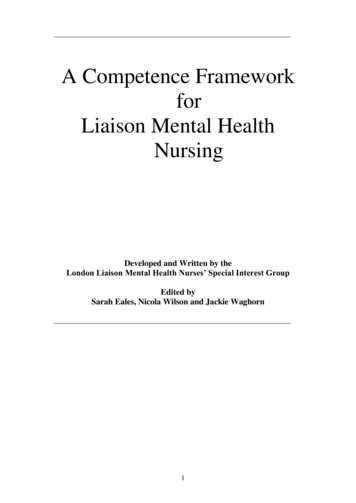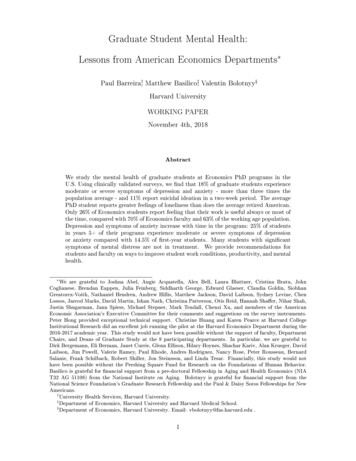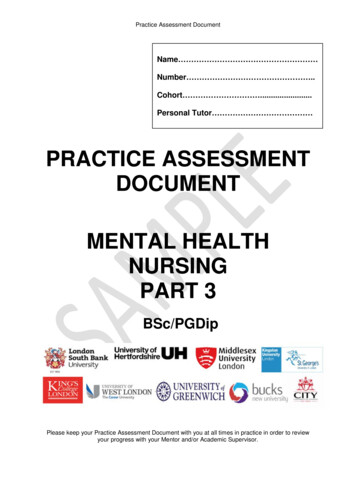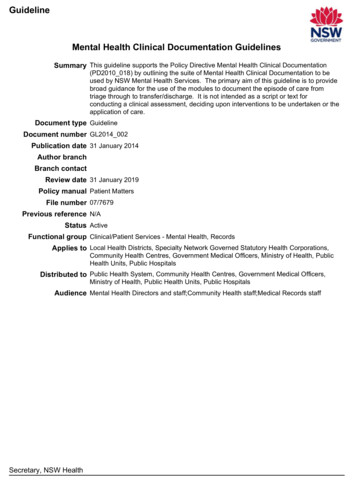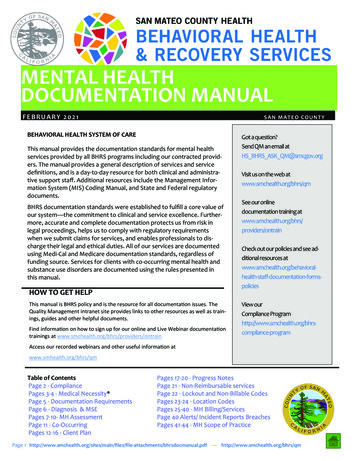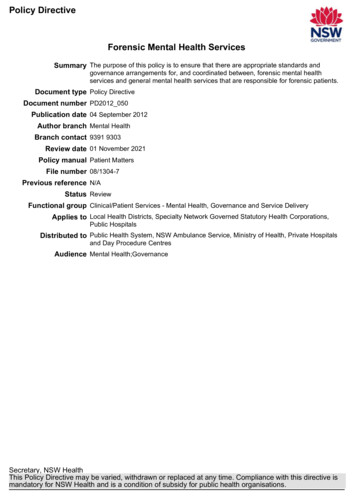
Transcription
Policy DirectiveForensic Mental Health ServicesSummary The purpose of this policy is to ensure that there are appropriate standards andgovernance arrangements for, and coordinated between, forensic mental healthservices and general mental health services that are responsible for forensic patients.Document type Policy DirectiveDocument number PD2012 050Publication date 04 September 2012Author branch Mental HealthBranch contact 9391 9303Review date 01 November 2021Policy manual Patient MattersFile number 08/1304-7Previous reference N/AStatus ReviewFunctional group Clinical/Patient Services - Mental Health, Governance and Service DeliveryApplies to Local Health Districts, Specialty Network Governed Statutory Health Corporations,Public HospitalsDistributed to Public Health System, NSW Ambulance Service, Ministry of Health, Private Hospitalsand Day Procedure CentresAudience Mental Health;GovernanceSecretary, NSW HealthThis Policy Directive may be varied, withdrawn or replaced at any time. Compliance with this directive ismandatory for NSW Health and is a condition of subsidy for public health organisations.
POLICY STATEMENTFORENSIC MENTAL HEALTH SERVICESPURPOSEForensic mental health services provide assessment, care, treatment, and other services to people withmental illness who are, or have been, in contact with the criminal justice system. The provision of healthcare services for forensic and correctional patients, and for civil patients who are a high risk of harm toothers, requires the coordination of specialist and general mental health services.The purpose of this policy is to ensure that there are appropriate standards for forensic mental healthservices and general mental health services that provide care and treatment to forensic patients.Forensic mental health services are underpinned by the same principles that underpin general mentalhealth services with the addition of specific principles, legislation and processes that are applicable toforensic and correctional patients, including the Mental Health (Forensic Provisions) Act 1990. Thegeneral principles include those such as the Charter for Mental Health Services in NSW. Forensic mental1health services in NSW aim to adhere to the National Statement of Principles for Forensic Mental Health.As with the broader NSW mental health system, an effective and efficient forensic mental health systeminvolves a strong collaborative approach between service providers.MANDATORY REQUIREMENTSThis policy applies to all Public Health Organisations which provide services to correctional patients, orforensic patients detained in mental health facilities or other places, or conditionally released in thecommunity, and to high risk civil patients that come into, or who are referred to, the forensic mental healthsystem.IMPLEMENTATIONLocal Health District Chief Executives, Health Service Executives, Managers: Assign responsibility, personnel and resources to implement this policy. Provide line managers with support to mandate this policy in their areas. Ensure that local protocols are in place in each facility to support implementation. Work together with the Justice and Forensic Mental Health Network (JFMHN) to ensure that LocalHealth District (LHD) policies, procedures and standards are consistent with statewide policies,procedures and standards set out for the forensic system. Report compliance with this policy to the NSW Ministry of Health as required.Chief Executive and Managers, Justice and Forensic Mental Health Network Ensure that the Guidelines for Forensic and Correctional Patient Ground Access, Leave, Handover,Transfer, and Release are reviewed and updated at intervals of no greater than three years. Work together with LHDs, and provide leadership and expertise in relation to the development ofsystem wide policies, procedures and standards for forensic mental health services.NSW Health Service staff and visiting practitioners providing relevant services: Comply with this policy.1Australian Health Ministers’ Advisory Council, Mental Health Standing Committee (2006) National Statement ofPrinciples for Forensic Mental Health.PD2012 050Issue date: September 2012Page 1 of 2
POLICY STATEMENTREVISION HISTORYVersionSeptember 2012(PD2012 050)Approved byDirector-GeneralAmendment notesNew PolicyATTACHMENTS1. Forensic Mental Health System ProtocolPD2012 050Issue date: September 2012Page 2 of 2
Forensic Mental Health ServicesPOLICYIssue date: September 2012PD2012 050
Forensic Mental Health ServicesPOLICYCONTENTSFORENSIC MENTAL HEALTH SERVICES .1GOVERNANCE OF FORENSIC MENTAL HEALTH SERVICES . 1COORDINATION OF PATIENT CARE .2TRAINING AND EDUCATION OF STAFF .2SECURITY STANDARDS .2LIST OF ATTACHMENTS .2PD2012 050Issue date: September 2012Contents Page
Forensic Mental Health ServicesPOLICYFORENSIC MENTAL HEALTH SERVICESThe Justice and Forensic Mental Health Network (JFMHN) is the principal service provider andcoordinating agency for forensic mental health services in NSW. JFMHN is a specialty network governedhealth corporation that provides a range of services to forensic, correctional, and high risk civil patients,and other persons in custody. The services provided include: The Forensic Hospital, Malabar; MentalHealth Unit, Long Bay Hospital; State-wide Community and Court Liaison Service; Adolescent Communityand Court Team; Community Integration Team; Community Forensic Mental Health Service; Mental HealthScreening Unit, Metropolitan Remand and Reception Centre and Silverwater Women’s CorrectionalCentre; and ambulatory mental health services within correctional and detention centres.Local Health Districts (LHDs) operate three medium secure forensic mental health facilities, those being:Bunya Unit, Cumberland Hospital; Kestrel Unit, Morisset Hospital; and Macquarie Unit, Bloomfield Hospital.LHDs operate general and low secure mental health facilities that accommodate forensic patients andcommunity mental health services that care for forensic patients conditionally released in the community.The Guidelines on Forensic and Correctional Patient Ground Access, Leave, Handover, Transfer, andRelease are attached to, and underpinned by, this Policy Directive.GOVERNANCE OF FORENSIC MENTAL HEALTH SERVICESMental Health (Forensic Provisions) Act 1990This Act provides the legislative framework for the forensic mental health system and specifies the care,treatment and control of forensic and correctional patients.Mental Health Review TribunalThe Tribunal has legislated responsibilities for reviewing and making orders in respect of the care,treatment, detention, transfer, leave and release of forensic patients.Local Health DistrictsLocal Health Districts are responsible for all legal, clinical and management accountability in relation toproviding services to forensic patients in their care. Local Health Districts are responsible for recruitment,performance, credentialing, and supervision of clinicians who provide care, treatment, or other services tocorrectional or forensic patientsJustice & Forensic Mental Health NetworkThe JFMHN is a Statutory Health Corporation established under the Health Services Act 1997.The JHFMHN provides health care in a complex environment to people in the adult correctionalenvironment, to those in courts and police cells, to juvenile detainees and to those within the NSW forensicmental health system and in the community.The JFMHN has a leadership role within the NSW public health system, working closely with governmentagencies and other organisations, including Corrective Services NSW, Juvenile Justice (DJJ), Local HealthDistricts, Community Controlled Aboriginal Health Organisations, NSW Police Force, Attorney General’sDepartment, Universities, community groups and advocacy groups, in relation to the provision of mentalhealth services to forensic and/or correctional patients.NSW Ministry of HealthThe Director-General of the NSW Ministry of Health has a range of oversighting and regulatoryresponsibilities for the public health system under the Health Services Act 1997, including forensic mentalhealth facilities and mental health services to forensic and/or correctional patients.PD2012 050Issue date: September 2012Page 1 of 2
Forensic Mental Health ServicesPOLICYCOORDINATION OF PATIENT CAREA forensic or correctional patient must have a named consultant psychiatrist, employed by a Public HealthOrganisation who is responsible for the provision of psychiatric services for the person.A forensic or correctional patient must have a named clinician who is responsible for the coordination ofany care, treatment, and other services provided for the person.A forensic or correctional patient must have a current risk assessment and risk management plandeveloped by the mental health service that is responsible for the provision of psychiatric services to theperson.A Memorandum of Understanding is to be entered into between relevant LHDs and the JFMHN,establishing a co-ordinated approach to patient transfers across forensic mental health services and theclinical governance of forensic facilities and mental health services that provide care and treatment toforensic and/or correctional patients.TRAINING AND EDUCATION OF STAFFClinicians who provide care, treatment, or other services to forensic or correctional patients must haveappropriate training in the prevention and management of violence and aggression. Advice on workforcecompetency standards and education and training requirements can be provided by the JFMHN.Clinicians who provide care, treatment, or other services to forensic or correctional patients should haveaccess to clinical supervision from a specialist forensic mental health clinician from an appropriatediscipline.The JFMHN is available to support LHD staff in relation to these requirements.SECURITY STANDARDSThe purpose of security is to enable the safe delivery of therapy to patients and in doing so, protect thesafety of patients, visitors, staff and wider community. Staff working in secure forensic mental healthfacilities must have training in the application and maintenance of appropriate relational security.Each secure forensic mental health facility must have a procedural security document (PSD) that definesthe physical security including the perimeter creating the secure area, which is annually reviewed. The PSDmust include procedures for preventing the entry of dangerous items into the facility, the searching ofpatients, their belongings and rooms, the searching of staff on entry to and exit from the facility, and theinspection of postal items entering or leaving the facility.The security arrangements of each secure forensic facility must be inspected and audited by anindependent agency on a regular basis but at intervals not greater than every two years.The JFMHN and LHDs must ensure that each secure forensic facility complies with relevant NSW Healthpolicies related to the security of NSW Health facilities.LIST OF ATTACHMENTS1. Guidelines for Forensic and Correctional Patient Ground Access, Leave, Handover,Transfer, and ReleasePD2012 050Issue date: September 2012Page 2 of 2
Guidelines for forensic & correctionalpatient ground access, leave, handover,transfer, & releaseVersion 1.0 September 2012
Version ControlThe Guidelines for forensic & correctional patient ground access, leave, handover, transfer, & release is aversion controlled document.1. BUILD STATUS:VersionDateReason1.0 (TRIM: DG28180/11)5/09/2012First version for publication.2. AMENDMENTS IN THIS RELEASE:Section TitleSection NumberNilJUSTICE & FORENSIC MENTAL HEALTH NETWORKABNABN70 194 595 506 (JH)98 691 736 453 (FMHN)PO Box 150Matraville NSW 20361300 Anzac ParadeMALABAR NSW 2036Telephone 61 2 9700 3000Facsimile 61 2 9700 auAmendment Summary
ContentsVersion Control . iiContents .iii6 Independent accommodation within amental health facility . 336.1 Definition.33Abbreviations .v6.2 Authority to allow ward placement .331Introduction . 16.3 Mandatory requirements .331.1 Purpose. 16.4 Preparation for independent placement .331.2 Guidance on usage . 26.5 During independent placement.341.3 Legislation . 271.4 Who are forensic patients? . 3Release . 351.5 Who are correctional patients? . 47.1 Requirements for the release of forensicpatients .351.6 The role of the Medical Superintendent . 47.2 Conditional Release .371.7 Relationship with the Forensic HospitalSecurity Manual. 57.3 Unconditional Release .401.8 Principles for the management of forensicand correctional patients in NSW. 68Travel. 429Transfer and Handover . 442Men
Forensic mental health services provide assessment, care, treatment, and other services to people with mental illness who are, or have been, in contact with the criminal justice system. The provision of health care services for forensic and correctional patients, and for civil patients who are a high risk of harm to others, requires the coordination of specialist and general mental health .
